#please watch oddtaxi
Text
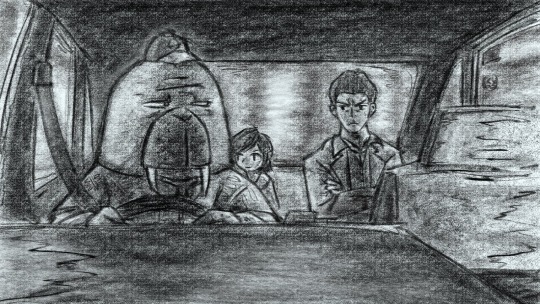
“to the arcade” - dame da ne guy
#oddtaxi#art#artwork#fanart#my artwork#odd taxi#please watch oddtaxi#hiroshi odokawa#kiryu kazuma#haruka sawamura#yakuza#rgg studio#rgg fanart#rgg#these two series are so similar i love them so much
153 notes
·
View notes
Text
FINALLY getting around to rewatching Oddtaxi (one of my favs tbh) and almost immediately I clock that Dobu has the same VA as Kunikida from Bungo Stray Dogs, which is very funny hearing Kunikida's voice coming out of this tough-guy gorilla mobster
0 notes
Note
Are there any mangas or anime you really enjoy?
Yes!!! :D here are just a few I especially love:
✧ Summertime Render - I LOVE THIS ANIME/MANGA OMG...... I cannot hype it enough. The plot and its twists had me at the edge of my seat throughout. All of the characters have such strong personalities, the villains are really well done, the mystery and action are executed wonderfully, the pacing is great, the setting is amazing, the ost scratches my brain!!! In short, everything about this series is 10/10 for me.
✧ Great Pretender - another series I love to pieces! The backgrounds are so aesthetically pleasing,,, uuuwaaaa. The characters are so memorable, and the plots for each individual con are amazing. I'm left breathless every time because somehow the stakes just keep raising. It's so good!!!!! The opening song is also such a banger?!?!!??!! orz I could listen to it forever.
✧ THEO by Aono Nachi - it's such a cute BL. 🥺 I loved the dynamic between Theo and Rei. Maybe it's because I'm weak to master-servant dynamics, but then I also like how emotional their romance is and how stubborn Rei is. It was really wonderful!!
✧ Marriage to the Wolf by Inui Hana - another lovely BL!! I adored the dynamic between Kaede and Ren. The way they couldn't stand each other in the beginning..... slowly growing closer and softening to each other. The way they're both doing things out of obligation at first because it's an arranged marriage and the fact that Ren is holding back for Kaede's sake...... THEIR BANTER!!!!!! orz orz
✧ Devilman Crybaby (the netflix adaptation) - THIS SHOW. It hurts me every time I watch it. The ost is a banger, the art style is amazing, the way I cried ugly the first time I watched it. The "why am I the only one speaking, Akira?" haunts me to this day. I highly recommend it.
✧ ODDTAXI - the plot and the twist omg!!!!!! And the mystery!!!!! I may be biased because Riddle's VA voices Odokawa and I love anything that Natsuki Hanae does!! His work is always outstanding. The opening is also another banger. I can't say much without spoiling something major, but I highly recommend this anime. It's definitely worth the watch!!!
✧ The Disastrous Life of Saiki K - Saiki K my beloved. It always manages to make me laugh. I love Saiki's character. He's so funny, as is the rest of the cast. Kaidou never fails to make me laugh, especially in the dub. He's so silly. I think about "drowning in inch-deep water isn't easy" every day LOL.
✧ Romantic Killer - AAAAA I LOVED THIS SHOW!!!!! Maybe it's because Anzu is such a relatable female lead to me (but also because Riddle and Leona's VAs voice two of the main love interests hehe). It's so fun! It also handles the serious aspects of its plot really well. I loved Anzu's dynamic with Riri.
✧ Death is the Only Ending for the Villainess - it's been a moment since I've caught up with this manhwa, but I love it!!! The characters are all really striking. Most of all, I really like Penelope's character!!! <3 she's such a strong female lead. I like her interactions with all of the characters.
✧ Toilet-bound Hanako-kun - this manga is everything to me!!!! I absolutely adore the plot and its characters. Hanako and Yashiro's dynamic is really cute. :D I forgot what chapter I left off on, but I remember it left me in shambles. T^T
48 notes
·
View notes
Text

funny little redraw of a scene in oddtaxi! please watch this show guys it’s SO good
#not a huuuge fan of how this came out but I like it!#oddtaxi#odd taxi#hiroshi odokawa#dobu odd taxi#digital sketch#art#my art#redraw#scene redraw
361 notes
·
View notes
Note
wait y'all please watch oddtaxi it's genuinely so good. walrus taxi driver meets a bunch of oddball characters while driving his taxi and gets caught up in a missing person investigation.
^
48 notes
·
View notes
Text
Why “Wakaba Flourishing” is a Masterful Episode

Source: Episode 20, Revolutionary Girl Utena
By: Beata Garrett | @zhongxia246
It’s difficult to pick one episode of Revolutionary Girl Utena (1997) as my favorite because they all lend weight to the overall story and the themes. Removing one, even the silliest such as “The Cowbell of Happiness,” feels wrong. However, I can safely say that Episode 20, titled “Wakaba Flourishing” is not only one of my favorite episodes, but one that deserves to be rewatched solely by itself for what it brings to the table.
Revolutionary Girl Utena is no stranger to fleshing out its side characters and making even the most unlikeable and shallow-seeming ones complex and fascinating. “Wakaba Flourishing” is special though because Wakaba doesn’t have the same level of a relationship with one of the council members or Utena in the same way as someone like Nanami or Shiori. Wakaba is Utena’s supportive friend, nothing more than that, and that’s one of the aspects that makes Episode 20 so successful. The show understands how it’s depicted Wakaba up to this point and how the audience views her so its focus on her struggles are rooted in that very “ordinary-ness” that she conveyed.
This post is an in-depth look at how “Wakaba Flourishing” peers into the inner lives of the “ordinary” at Ohtori Academy and theories about visual symbols throughout it. If you’ve read my other post, “Why ODDTAXI’s Episode 4 is a Masterpiece” (https://theanimeview.com/2022/01/18/why-oddtaxis-episode-4-is-a-masterpiece/), this post will be similar to that one.
Without further ado, let’s get into why “Wakaba Flourishing” is a masterful episode.
[Editor’s Note: Please assume from this point forward that everything–quotes, images, and summaries–in this post, unless cited otherwise, comes directly from Episode 20 of Revolutionary Girl Utena (1997). This post also goes into spoilers for the entire series. Thank you.]
Disclaimer: This post mentions domestic violence, which may be upsetting for readers, and I highly recommend looking up warnings if you plan to watch the entire show. Please click “Keep reading” if you’re comfortable with this warning.
The episode begins with Wakaba walking to her dorm amidst a voiceover of students talking about Saionji’s recent expulsion from the academy. Near the end of this voiceover, one girl says, “I really had a thing for him for a while there, too” and his previous popularity is made evident–as well as the fact that no one truly cared for him. Amidst this are flashbacks to the duel that caused Saionji to get expelled as he fought Utena and injured Touga when the latter jumped in front of Utena to “save” her.
As the girls continue talking, the show hammers in how pathetic Saionji has become in the eyes of the students and his previous admirers. He’s no longer special to them in the same way that the rest of the student council is. Yet, despite all this, the girls reminisce on how cool he was before he was expelled and wonder where he is now. Using this voiceover at the beginning of the episode conveys just what kind of image Saionji had built for himself at the academy and a larger commentary on the lookism that allowed him to prosper for as long as he did. As the audience, we know Saionji regularly hit Anthy and that his goal was to one-up Touga by achieving something eternal.
However, Saionji’s cruelty was ignored by everyone because he was an attractive boy who was good at kendo and who served on the student council. Even Wakaba, when she and Utena witnessed Saionji hitting Anthy, dismissed his violent tendencies and blamed the victim instead. Unfortunately, Saionji’s reputation hasn’t been completely damaged by his expulsion and instead given him a new air of mystery that works in his favor.

As Wakaba walks home, it’s interesting to note how far away she is from the academy. Unlike Utena and the other council members, she lives off-campus. Her route home takes her down stairs and inclines, symbolizing that even in terms of where she lives, she’s not as special as those who are allowed to live on-campus. It also demonstrates how distant she is from the true core of Ohtori academy and the duels and power struggles that occur there. She lives amongst other “ordinary” people who live their everyday lives away from the academy and the show takes the time to show all of this so the reveal that Saionji is now living with Wakaba is made even more shocking.
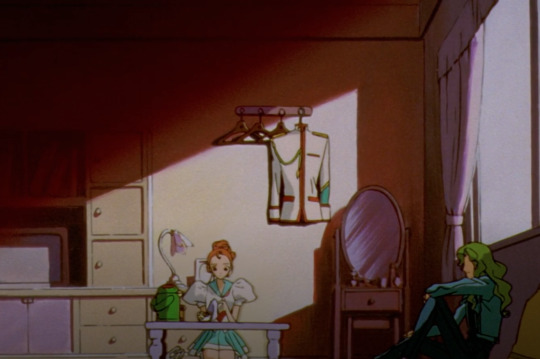
What’s really jarring to me is not Saionji actually living outside the academy, but that he’s no longer wearing his uniform. Costume design is really interesting to look at, especially in a show where the outfits are so homogenous for the most part. Saionji’s new outfit emphasizes how he’s fallen, especially when we see his uniform on a hanger in some shots, but also humanizes him. He’s always been a teenager, but only now does he look like one for the first time.
In the shot above, you can see Saionji’s bag is still there. He hasn’t made himself at home quite yet because he still holds out hope that he’ll return to the academy and regain his place there, but Wakaba’s decision to buy matching cups for them both indicates how serious she is about him and how much she wants him to stay. It’s a recipe for disaster as these two characters are clearly at odds with how invested they are in this relationship.
The Matching Cups
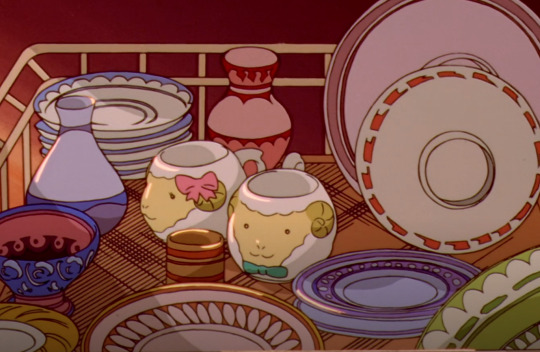
Let’s get more into the matching cups themselves and what they could possibly represent.
First of all, they’re pretty cute and represent Saionji and Wakaba respectively, as seen by the bow on the sheep cup and the green bowtie on the ram one. As I mentioned before, Wakaba buying them indicates how much she wants Saionji to stay despite her agreeing to help him return to the academy. I don’t think she recognizes this desire yet as it’s a subconscious wish until she’s threatened by him actually about to leave and return to the academy (and to Anthy).
The matching cups also indicate to me that Saionji and Wakaba are more alike than perhaps either one would like to admit, and for a reason that may be unpalatable to them both. Sheep and rams aren’t seen as animals that are threatening or special in any way but as submissive, domesticated animals. Despite Saionji seeing himself and being seen by others as special, the matching cups and his role throughout the story is far from being anything special.
At the beginning, Saionji is almost bland and comical in how evil he is and it’s made clear after the first two episodes that he isn’t as big of a threat as the other council members, especially Touga. He’s easily manipulated by those around them and pushed into leaving school. When he does leave, he still believes Touga is a true friend and has his best interests at heart.
Saionji’s naive nature and role in the anime makes the matching cups very appropriate as, in the eyes of the audience, Saionji is ordinary and gullible too. He’s a supporting character who couldn’t even cut it as one of the big villains. By getting matching cups, Wakaba is noticing that the two are similar than he wants to admit and signaling this to the audience.
Manipulations
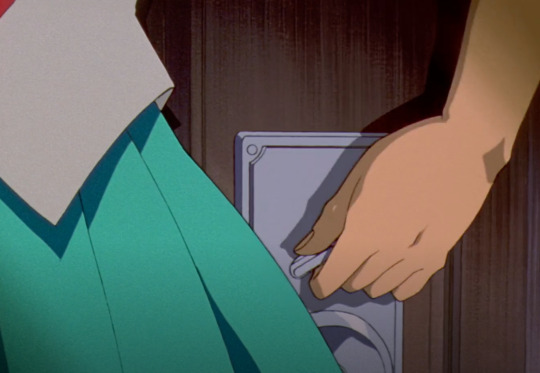
It’s made immediately clear how much Saionji is manipulating Wakaba by playing upon her pity and love for him, but Wakaba isn’t entirely a victim either and is also using him, subconscious as it may be. When Wakaba arrives at the dorm, Saionji greets her. In response, she smiles and quickly locks the door. Wakaba’s first question to him is, “Did anyone come by?” and while it may come off as concern that he’ll be discovered living with her, I read these actions based on the fear that someone will take him away and the desire to keep him to herself.
Throughout the episode, Wakaba calls Saionji her “secret” and there’s a clear pleasure that she gets out of doing so. It makes her happy to feel relied on and she thinks to herself, “he was a distant dream that I thought I could never reach. When you think about it, I never could have had him.” These thoughts are important because they show how Wakaba’s love for Saionji now is partially based on possessing something that was previously unattainable. Despite his cruelty towards others and even her when he posted her love letter for everyone to see, she still helps him out because she wants to be close to him and to be special. Unlike all those other girls at the beginning who wondered where Saionji was, Wakaba knows where he is. In her mind, she’s different from them and has begun to be separated from ordinary people.
On Saionji’s end, he apologizes to Wakaba for still staying in her room but has no intention to leave. I find it funny and sad that Wakaba ignores most of his posturing and his flattery towards her as if she’s heard this before (and probably has), but the moment he pretends he’s leaving, she practically begs him to stay.
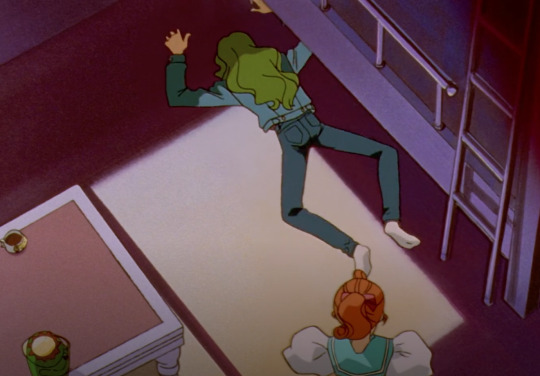
Unfortunately, Wakaba never gets to ask him if he’d like to begin dating as she clearly wants to when they’re interrupted by a fellow student knocking. In one of the funniest bits in the show, Saionji promptly spider crawls away and hides under the bed. When he crawls out, he pretends to be cool again. It’s a ridiculous scene but emphasizes just how in love Wakaba is with him and what he represents that she’s willing to ignore his pathetic moments.
A Special Secret
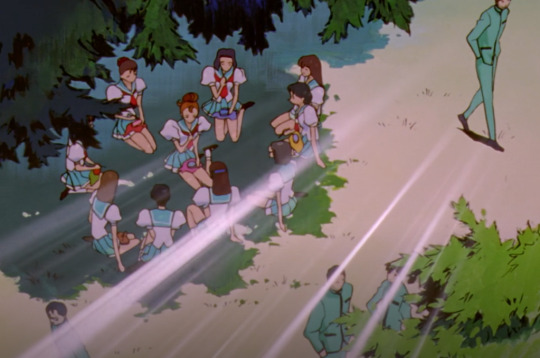
On the surface, Wakaba seems happy, but it’s shown that she’s neglecting other things in her life like hanging out with Utena to return to Saionji at home. Ironically, Wakaba’s desire to keep Saionji with her to make her special, as if some special quality of his will rub off on her, is similar to people’s desire to possess the Rose Bride or Sword of Dios throughout Revolutionary Girl Utena. By possessing both, a duelist is supposed to have “the power to revolutionize the world” yet no one has done it yet. Even Utena doesn’t revolutionize the world by the end of the series.
Saionji doesn’t actually make Wakaba more special, but the show implies that there is some change that comes over her. Utena notices it and asks Wakaba whether something good happened to her, which she laughs off. There’s a montage of Wakaba “flourishing” and doing well in school and, most importantly of all, being the center of attention. One question I’d like to pose though is whether this would’ve happened anyway without Saionji and I truly believe it would have. Rather than it being a case of Saionji transferring some special quality to her, I believe that this is more a result of distancing herself from Utena and of showing us the results of confidence.
When Wakaba is around Utena, Wakaba fades into the background. Even in terms of character design, Utena is meant to stand out amongst everyone, including the student council and we’ve never seen Wakaba around other people without Utena. Perhaps, when not focused on the most “special” person at the academy beside her, Wakaba truly does flourish. It’s also important to note that this kind of flourishing is one that our society typically deems successful–that is, Wakaba flourishes academically and socially, but, like many other successful characters in the series, there remains a fragility beneath this exterior. It’s surface level and built on a shaky foundation.
The Myth of Being Special
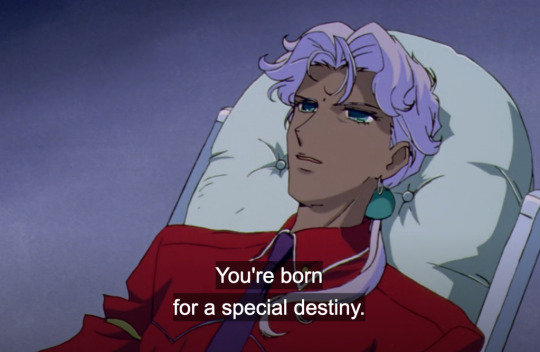
As Utena’s curiosity over Wakaba’s recent change increases, she turns to a recently growing confidante and the true antagonist of the show, Akio. By this point, Akio has successfully charmed her into believing they’re truly friends or that, at the very least, she’s found a caring and trustworthy adult to talk to about her problems. Instead of telling Utena to talk to Wakaba though and communicate in a healthy manner, Akio only isolates Utena more by perpetuating the myth of being special.
Akio even tries to sever Utena’s ability to empathize with Wakaba by telling her, “You wouldn’t understand, would you? You’re born for a special destiny […] Most people exist as one among many. But, given the chance, they can shine as they never have before.” However, he points out that this ability to shine is only temporary though. This talk with Akio reminded me of the ways in which adults burn out children by putting their worth onto their abilities and some intangible thing like being gifted. It’s true that some kids may be more advanced in areas than others, but the special treatment that’s given to them and the conditional worth placed onto them has many negative consequences. A lot of kids labeled as gifted grow older and find themselves burned out by these expectations.
Akio’s speech places Utena on a pedestal, but it also reveals his own arrogance as he clearly believes himself to be special too. When Akio fell from grace as Dios, he still sought power in any way that he could and believed himself to be above all law, including morals, because he was the prince.
Similarly, other characters in Revolutionary Girl Utena believe in this myth of being special that is cultivated at Ohtori and fixate on their relationships or being good at something. For example, Nanami believes that being Touga’s sister makes her special in ways other girls can’t compare to but remains threatened whenever her brother becomes romantically or sexually intimate with someone else. Miki is applauded for his academic intelligence and Juri for her athleticism, yet both are unable to attain happiness and yearn for someone who truly understands them beyond those traits. Being special is not fulfilling, the show seems to tell us, but is actually rather lonely.
One last note I have about this scene is the lighting. I assume the two are talking in Akio’s planetarium and while there is enough light to see them, it’s still pretty dark in there. I believe this is representative of how Akio is misguiding Utena, leading her into the dark if you will, and that despite the stars that Akio is looking at, he doesn’t have any intention of truly enlightening her.
That Leaf Hair Clip and Girls as Meat
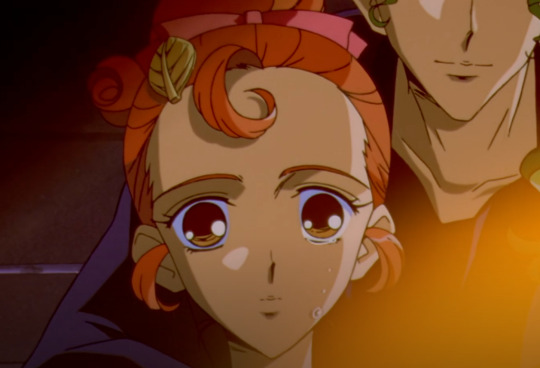
About halfway through the episode, Wakaba comes home one day to find Saionji making a hair clip for her. What’s especially interesting to me is the choice of color and motif for the clip. Roses are so prevalent in Utena, but they belong solely to those connected with Utena’s prince and to the duelists. Wakaba’s hair clip is not any kind of flower, but is a simple leaf in a color not quite gold. Despite this simple gift, Wakaba cries because of it and the hope that it may mean Saionji has feelings for her or is beginning to. To her, the hair clip signifies that she’s almost completed her transformation into being someone permanently special.
However, life is cruel and, as more time passes, Wakaba realizes that Saionji still cares more about Anthy (or the Rose Bride, specifically) than about her. He asks after Anthy while not even looking at Wakaba; it’s as if he can’t either be bothered to or because he’s a coward. For the first time, Wakaba consciously realizes that Saionji going back to school will mean forgetting about her. The hair clip, while nice and still meaningful as Saionji truly did it out of a moment of appreciation, doesn’t erase the fact that he’s still clearly set on Anthy.
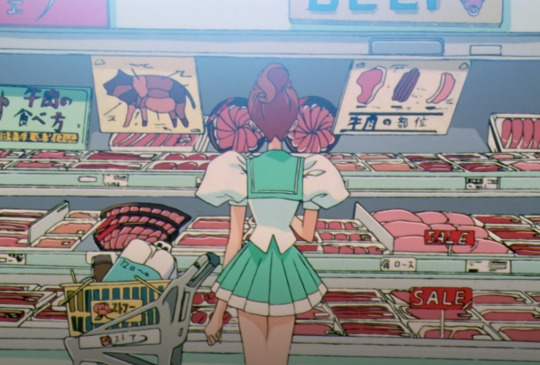
The setting for this realization is at a supermarket. As the Absolute Destiny podcast points out in their great episode on “Wakaba Flourishing,” Wakaba’s grip on the packaged meat she’s holding parallels the tension in that conversation with Saionji. As she presses her fingers against the plastic wrapping, almost but not quite breaking it, the tension in the other scene and their overall relationship is increased.
I also love the supermarket setting because the choice of packaged meat instead of something else brings the animal imagery in the show to mind again.
Throughout the show, girls are compared to animals and have animal counterparts. This is most evident with Nanami, who has a pretty antagonistic relationship with many animals because she doesn’t get along with Anthy, who is an animal whisperer of sorts (similar to witches or princesses having familiars and affinities for wildlife). In “The Cowbell of Happiness,” Nanami is literally turning into a cow and this comes with the realization that she’s actually been treated as livestock for most of her life by her parents and Touga. There’s more cow imagery later with even Utena and Anthy being connected to it through bell earrings and certain poses that call back to “The Cowbell of Happiness.”
In short, the idea of girls as livestock to be used and consumed by the men in their lives who are in a position to hurt them is brought up time and time again. Because of it, I read much deeper into Wakaba’s scene in the supermarket than is perhaps reasonable. I believe setting this realization in the meat aisle and having signs that even point out that the meat is on sale points to how Wakaba realizes that she herself has a limited time to win Saionji over. She is meat that will go bad soon and that is being sold.
Simultaneously, she’s also in a position of power as a consumer buying the meat. In this vein, I read it as the power she has over Saionji as she’s also keeping him like livestock in a sense. It would be easy to see the relationship as one only of Saionji using Wakaba and while I do see it as him manipulating her more, Wakaba is also possessive over him and stops having his best interests in mind. This isn’t to say that she’s the true villain of the episode, but rather to say that she’s been so conditioned to think of herself as unordinary and to value the idea of being special that she is using him subconsciously. During her confession in Nemuro Memorial Hall, Wakaba despairs that “A little longer and I would have changed myself forever.”
The show has told us how important the hair clip is to Wakaba so the loss of it is devastating. While Saionji may have the potential to change, he clearly isn’t going to this episode as he hands the hair clip over to Mikage in return for his expulsion being revoked. Mikage even calls the hair clip “a trifle” and Saionji calls it “that thing.” The words both boys use for this object that means so much to Wakaba tramples over her feelings.
Mikage clearly knows the importance of the hair clip because he uses it to push Wakaba to the edge. Through some kind of magic or collaboration with Akio, Wakaba sees Anthy wearing the hair clip. There are no words exchanged as she watches Anthy walk away, but the look on her face is one of devastating hurt and she ends up in Nemuro Memorial Hall. And, as viewers of the show know, nothing good happens in Nemuro Memorial Hall.
Another interesting word choice for Mikage and Saionji’s conversation is Mikage calling Saionji’s exile “purgatory.” The purgatory that people may be most familiar with (like me) is similar to limbo as a state neither in heaven or hell. Those who go to purgatory must undergo purification before they enter heaven as a kind of punishment. By implying that Saionji’s current state is purgatory, Mikage poses Ohtori academy as heaven and Saionji’s time with Wakaba as punishment rather than a kind girl being taken advantage of by a boy she liked.
Wakaba’s Confession
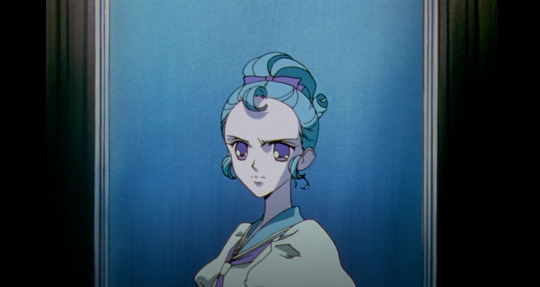
Every confession done in Nemuro Memorial Hall is striking in its own way, but Wakaba’s is painful to me in a way no one else’s is. As she pours out her feelings, she doesn’t blame Saionji for giving the hair clip to Anthy but blames Anthy. Wakaba says, “That girl, with a face that says she alone is special, will steal everything away from me!” In contrast to Anthy as having a special visage, Wakaba denotes herself as “a face in the crowd.” This is painful because she has been a face in the crowd until this episode. The only thing that distinguished Wakaba was her relationship to Utena for viewers of Revolutionary Girl Utena and this adds a meta layer to the confession. While Wakaba’s confession avoids the core issue of the problem, which is Saionji’s treatment of her exacerbating her insecurity, it succeeds in confronting the viewer in how we view those not special enough to get screen time and how this carries into reality (think of how we idolize celebrities and popular kids in school).
When Wakaba leaves Nemuro Memorial Hall and confronts Saionji, startling him, he offers no apologies or thanks. He tells Wakaba, “I’m going back to my old world” as if she doesn’t go to the same school as him. Saionji makes it clear that he has no intention of even acknowledging her once he leaves by stating that he’ll mail Wakaba something more expensive to replace the hair clip.
Wakaba isn’t visibly surprised by any of this at all. She rejects Saionji’s offer and tells him, “I have something nicer now,” showing off her Black Rose duelist ring. During this entire conversation, Wakaba’s face is blank and her eyes are almost dead. It’s a startling departure from her typically cheerful demeanor. She then proceeds to take her sword from his chest. Again, this is part of the typical formula for duels in the Black Rose Saga, but Wakaba’s is striking in how violent it is.
In previous episodes, the Black Rose duelists aren’t as aggressive and the sword that they pull from their victims usually comes out on its own. However, the way Wakaba is animated to rush at Saionji, physically overpower him, and rip the sword from his chest is uniquely hers. It’s the only one in which I see more anger than sadness and feels very appropriate as Wakaba’s feelings for Saionji are very one-sided and as Saionji, who prides himself on his masculinity, is physically overpowered by a girl he deemed weak.
Daily Dose of Shadow Girls
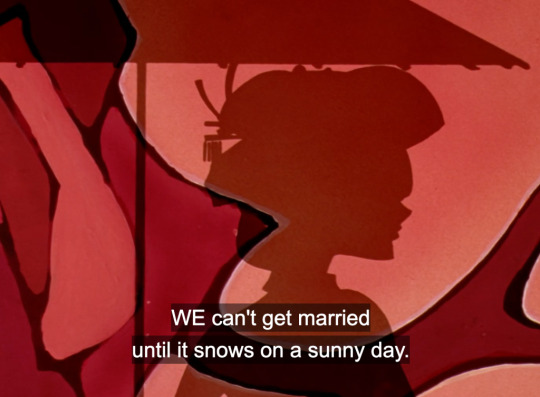
For this episode’s skit featuring the shadow girls, it’s a very short one! My reading of it was that the shadow girls are mocking the ridiculous games that go into dating and relationships in general, but specifically pointing out how girls often get the short end when in relationships with men. It’s also curious that the shadow girls divide themselves into a fox girl and a rabbit girl in a way reminiscent of how girls are either sanctified or demonized. I think this reading has more validity considering the depiction of the rabbit girl in a traditional hairstyle as if she’s presenting herself as more demure before switching to a Playboy bunny outfit. In reality, the rabbit girl is what she is either way but it’s a question of presenting oneself to be appealing enough for marriage.
In response to the conundrum, Utena tells the girls, “Why not just NOT get married?” Interestingly, this is right after the rabbit girl says that these traditions are law for them. Utena’s response is also ironic considering that she is part of this very system. The conditions for being the Rose Bride are just as arbitrary, something Utena even acknowledges at the beginning of the series, but this response demonstrates a certain carelessness to Utena’s character that we’ve seen previously and that will be important in the future.
The Duel

The duel in this episode is my favorite in the entire anime. The finale is a close second. For Wakaba, the tables that show up during duels in the Black Rose Saga are filled with the leaf hair clip in multiple colors. To me, this represents all of the possibilities and potential Wakaba, and potentially Saionji, could’ve had if things hadn’t gone the way they did. The spread of colors is once again reminiscent of how flowers come in all colors when you take natural and dyed ones into account yet leaves are never given the same treatment. Leaves are just seen as accessories, as background characters, to the flowers so seeing them in as many colors as flowers can be read as both touching and tragic. On one hand, Wakaba’s nature as a leaf will never change, it seems to say, yet the leaf is just as worthy and as full of potential as the flower, isn’t it?
As with Wakaba pulling the sword from Saionji, her duel with Utena is vicious and one of the most aggressive in the show. It’s also one of the few times I’ve been afraid that Utena may lose as she takes on the defensive position and refuses to pull the sword from Anthy. Utena still sees Wakaba as a friend, but Wakaba views Utena as an enemy and vents her frustrations with the entire system and Saionji onto her. She scoffs at Utena’s ability to understand her, yelling “You and that girl and the student council, too! You use the special gifts you were born with and, without a second thought, trample the rest of us!” It’s a powerful sentiment because there’s a kernel of truth in there.
There’s an earlier episode in Revolutionary Girl Utena titled “For Friendship, Perhaps” and I feel that this episode would’ve fit that title in some ways. Utena never pulls her sword on Wakaba and uses Wakaba’s own sword to cut the rose on her uniform instead. There’s a pivotal moment when she grabs Wakaba’s hand, acknowledges that she can’t fully understand her but still wants her friend to be happy, and spins her around. While previous duelists have fallen to the floor, signaling they’ve lost and have now been abandoned by the Black Rose Circle, Utena holds onto Wakaba.
Friendship doesn’t fix everything, but I like to think that Wakaba understood that Utena cared for her at that moment. It’s also the second time Wakaba cries in the episode as she finally resigns herself to the understanding that Saionji never cared for her, but that Utena does. To me, it’s pivotal that she cries while looking at the castle that hovers above the dueling arena–it’s as if she realizes how unreachable the ultimate special place is.
Black Rose duelists lose their memories after a duel and it’s significant that they still carry a large portion of the problem burdening them before it afterwards. As Wakaba takes her long walk home, there’s a sense of melancholy as she’s no longer rushing towards Saionji. But there’s also some peace in it as well even if no one is there to welcome her back anymore.
Concluding Thoughts
I feel as if I’ve been writing this post for a long time, but I know there’s some things I missed. This is such a packed episode and shows how successful Revolutionary Girl Utena is at utilizing its formulas and in creating visual imagery. I don’t rewatch the entire show every other month, but this is one of my favorite episodes to put on when that itch comes. There’s no doubt in my mind that “Wakaba Flourishing” is one of the best episodes on Revolutionary Girl Utena.
#Revolutionary Girl Utena#Analysis#RGU#Revolutionary Girl Utena analysis#Shoujo Kakumei Utena#Wakaba Shinohara
314 notes
·
View notes
Text
So I answered an anime survey the other day, and it asked how many animes I've ever seen in my lifetime
I had fun remembering all of them, I just wanted to post it somewhere. (under the cut)
My rules were, I had to have sat down to watch at least one episode. So it doesn't count if I only seen a couple clips online; And one episode counts, to whether or not I've seen an anime; An anime series is counted as one, but a spinoff is it's own entry. (ex. I paired all of the original Inuyasha together (The movies, The Final Act), but seperated Inuyasha/Yashahime); And in the survey, standalone movies were their own entry too
In all, I've seen 104 entries. (so far)
Every Anime I've Ever Seen (in no particular order)
Bakugan
Yugioh
Pokémon
Spirited Away
Princess Mononoke
Ponyo
Howl's Moving Castle
Cardcaptors
Death Note
Full Moon wo Sagashite
Pretty Cure
Sailor Moon
Only Yesterday
Whisper of The Heart
Kiki's Delivery Service
Inuyasha
Yashahime
Maison Ikkuko
Ranma 1/2
Osomatsu-san
Tales from Earthsea
Eureka!
My Neighbor The Yamadas
Pom Poko
Trigun
Wolf Daddy
Beastars
Brand New Animal
Aggretsuko
Oddtaxi
Mob Psycho 100
One Punch Man
Ouran High School Host Club
Fruits Basket
When Marnie Was There
The Secret World of Arrietty
High Rise Invasion
Cells at Work
My Hero Academia
Attack on Titan
Zombieland Saga
Mermaid Saga/Forest
Evangelion
I! My! Me! Strawberry Eggs
Soul Eater
DNAngel
Angel Densetsu
Ao Oni the Animation
Ai Yori Aoshi
Berserk
Bocchi The Rock
Spy X Family
Hunter X Hunter
Naruto
Ristorante Paradiso
Chainsaw Man
Carole & Tuesday
My Roomate's a Cat
Akira
My Neighbor Totoro
Dragonball
Darling in the FranXX
Chrno Crusade
Eizouken
Elfen Lied
Fullmetal Alchemist
Hetalia
Ghost Stories
Haikyuu!!
WitchBlade
Demon Slayer
Lovely Complex
Mononoke
The Junji Ito Collection
Tokyo Ghoul
Paprika
Perfect Blue
Tokyo Godfathers
That Time I Got Reincarnated As a Slime
Hellsing
Tokyo Mew Mew
Ace Attorney
Nichijou
Skullface Bookseller Honda-san
Castlevania
Final Fantasy
Gintama
Kill la Kill
Panty and Stocking
Mieroko-chan
Please Save My Earth
Revolutionary Girl Utena
Scott Pilgrim Takes Off
Flavors of Youth
Sonic X
Castle in the Sky
Nausicca
The Powerpuff Girls Z
Jujitsu Kaisen
Hamtaro
Pop Team Epic
A Whisker Away
The Cat Returns
Kotaro Lives Alone
1 note
·
View note
Text
thank you for the tag beloved @sugardaddyreo really love doing fun games like these! ^^
favorite color: specific shades of blue and green
currently reading: dorohedoro!
last song: oddtaxi by skirt and punpee (such a good song please listen and drown in it aaaa)
last movie: hm, top gun: maverick (watched it with my dad!)
last series: watching these at the same time lmao. in no particular order; everybody hates chris, trigun stampede, mashle, demon slayer, vinland saga, hell's paradise
sweet, spicy, savory: always savory, i fucking love sodium. but all three tbh :p
craving: hm, something nice, hot and filling. like cream-based soup with warm bread.
tea or coffee: tea, coffee gives me tummy aches sometimes ;-;
currently working on: cleaning my room, degree admissions and praying for my semester's results to be good ;u; (it won't be)
tagging: anyone! please please go for it if you're interested! 🤍 mwah
2 notes
·
View notes
Text
Mini-Review: Odd Taxi
Set in a world of anthropomorphic animals, it tells the story of walrus taxi driver Odokawa, who converses with his customers and learns about various mysteries and oddities occurring in Tokyo, including a schoolgirl's strange disappearance that leads to him being followed by both the police and the yakuza.
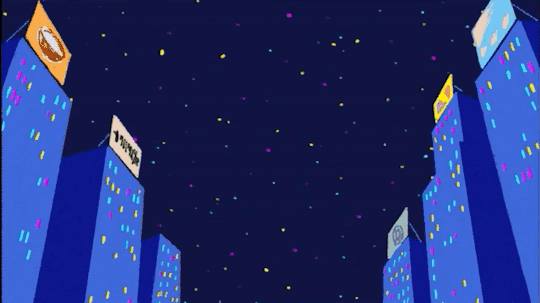
This was a really good suspenseful mystery. Like, really good. The many different threads and people, the connections made simply by having had the same taxi driver in (what appears to be) a small part of a larger city. There were a few minor bits that felt contrived (like OK, sure, this character is going to end up here for plot reasons without actual reason) but they were few and far between.
This was also a show that made great use of the medium of animation. I don’t mean in a showy, illustrative way--not like, for example, how Nichijou used different animation styles and broke the bounds of reality frequently--but while I was thinking that this could almost be a primetime live-action drama (and let’s be real: it could), animation allows it to add layers and details what wouldn’t work with live people.
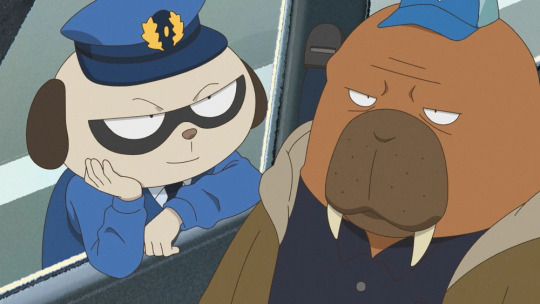
ODDTAXI does a great job keeping up the suspense. Even going into the final episodes, I couldn’t guess how it would end. And I think it managed to pull of a satisfying conclusion, which was the hope, but not a sure thing (after getting burned with how Wonder Egg Priority built up amazing story with suspense...only for it to crash and burn in the finale, I was understandably worried).
I saw this described as neo-noir, which I think makes sense. it’s suspenseful and at times thrilling, but the viewer is kept in the dark until the very end--in a way that’s not frustrating--when we get final answers and everything comes together. That doesn’t mean the 12 episodes of leadup are just mounting pressure with no payoff: throughout the series, we see characters making decisions, taking action, and affecting others, who then make their own decisions. There’s plenty of action and story reveals here to keep you entertained and engaged, but I was impressed with how the overall sense of mystery didn’t lessen until the very end.
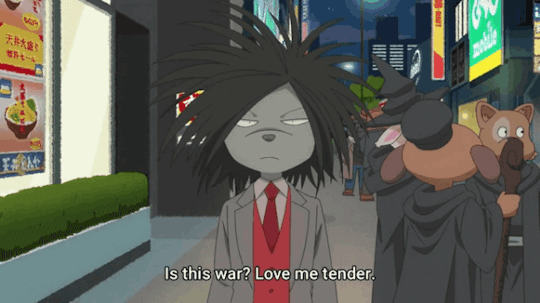
This is a show that rewards perceptive viewers. I was able to put together information and clues several times and the feeling when the payoff came was great. These characters, and many events, are entwined, and the way it comes together at the end was great. I’m a little surprised it doesn’t seem to have been very popular on Tumblr, at least judging by the number of [non-spoilery] gifs I could find to use in this review, but perhaps that’s because it’s a decently self-contained story and also isn’t focused on potential romantic relationships.
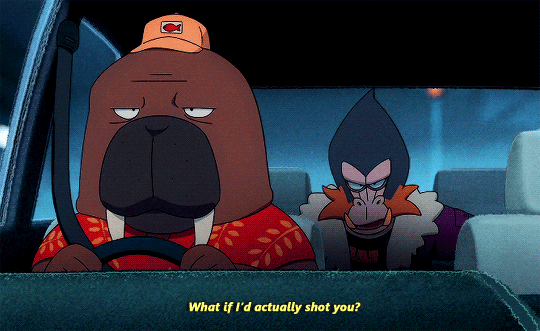
Odokawa finds himself in the middle multiple different plots, mostly (as far as we know) by virtue of his job as a taxi driver making him privy and party to many different people’s conversations. Are those conversations just part of a bored middle-aged guy’s small talk, or is he subtly working a scheme? When multiple parties start looking at Odokawa in connection with a girl’s disappearance and some shady mysteries, is he just supremely unlucky, or an active participant? Are these things coincidences or something else?
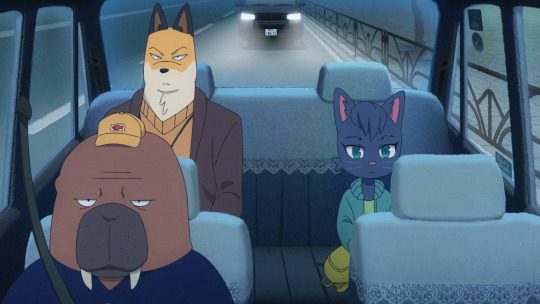
Verdict
English dub? Yes. The voice acting is great, characters sound like adults. And considering how many adult men in particular there are, I was pleased that they were all distinct.
Visuals: Very good. And the fact that the characters are animals isn’t a funny joke--it was helpful for telling characters apart, and it (plus the bright colors) added contrast that gave another dimension to the feel of watching the show: the surrealism of watching people get caught up in (or perpetrate) illegal schemes with truly menacing consequences, all shown as brightly-colored cartoon animals.
Worth watching? Yes. There’s so much that’s hinted at, but the show does a great job leaving you wondering whether it’s going to factor into the plot, or if it’s just part of the world or people’s lives. It was interesting and engaging, with a good balance between the things the audience knows but the main character doesn’t (there’s a good-sized ensemble cast and the story not infrequently jumps over to them), and things the audience doesn’t know and the main character either definitely doesn’t know (we’re all in the dark), or might not know (audience doesn’t know, and part of the suspense is whether Odokawa does or not).
Where to watch (USA, as of July 2022): Crunchyroll
Click my “reviews” tag below or search “mini review” on my blog to find more!
3 notes
·
View notes
Text
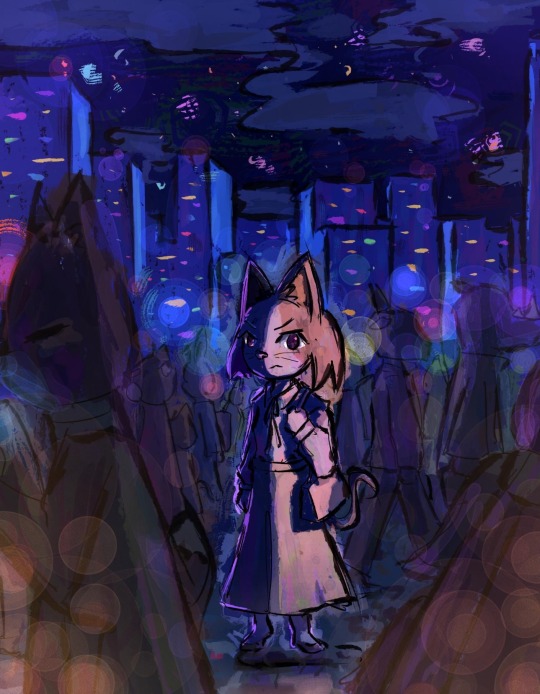
badger games featuring shiho ichimura
#art#artwork#original content#fanart#my artwork#oddtaxi#odd taxi#please watch oddtaxi#i love standing in the middle of a crowd blocking people’s way#my face when the idol group is involved with nefarious criminal activities
100 notes
·
View notes
Text
Hajime Tanaka Icons
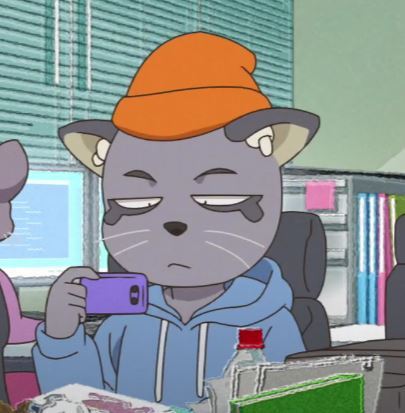
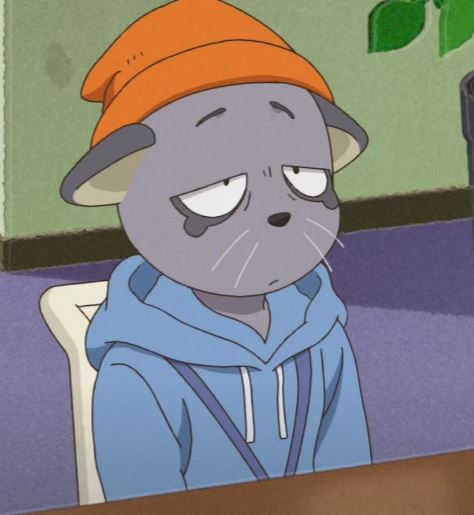
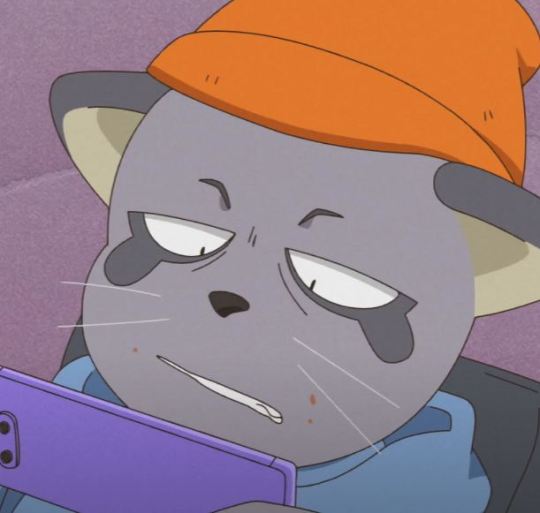
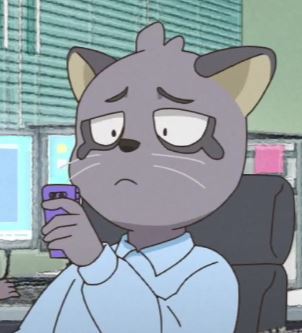
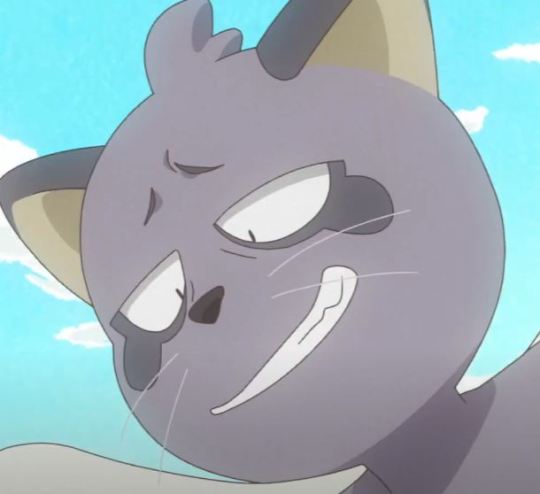
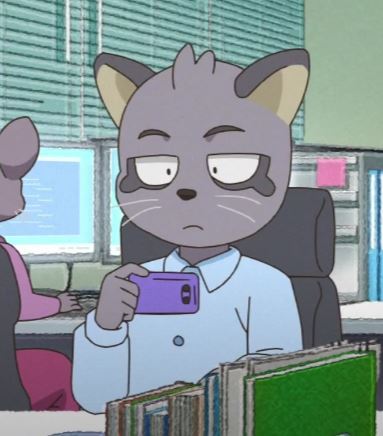
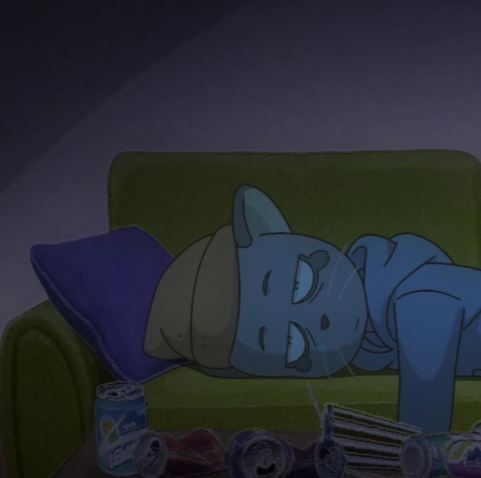
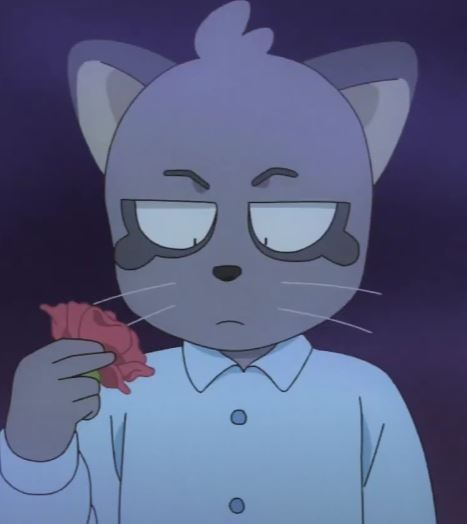
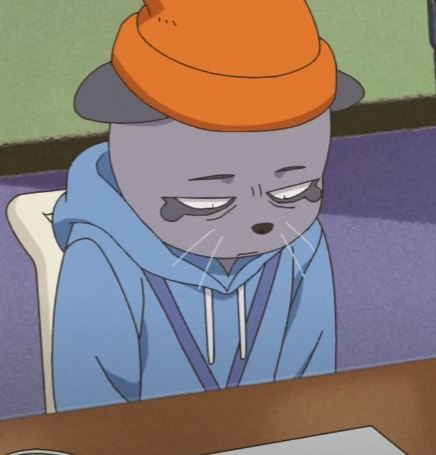
#oddtaxi icons#Icons#Anime icons#oddtaxi#Odd taxi#オッドタクシー#Please for love of Jebus watch oddtaxi. I'm begging#He's so smol but freaky#baby boy. baby. Evil#Like or rb#You know the drill#Hajime Tanaka#田中#田中一#pfp
183 notes
·
View notes
Photo
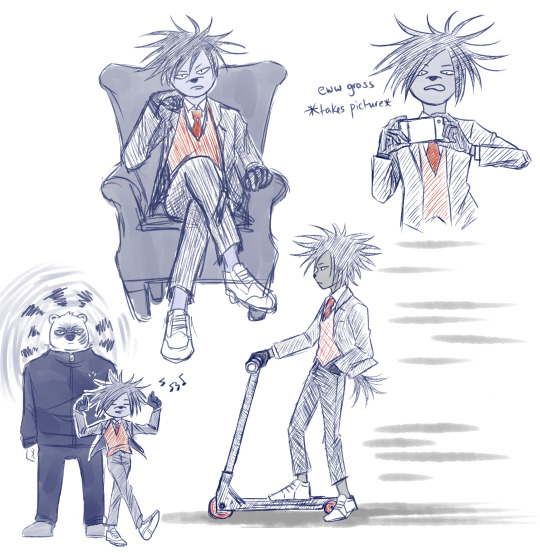
ORE GA YANO
#odd taxi#yano#my fav is the porcupine gangster in the 3 piece suit#who rides around in a scooter and speaks exclusively in rap#please watch oddtaxi for him#my art#doods
141 notes
·
View notes
Text
(odd taxi spoilers)
OH SHIT I WAS RIGHT. ONE OF MY GUESSES ABT THE KILLER WAS RIGHT FUCK U
also um thoughts (super spoilers)
man the missing girl case really was like a side story huh? the marketing pushed it so much tho... i guess it makes sense since it’s the catalyst for the rest of the plot, n tbf idk what i’d focus on if i was in the marketing team
i’m surprised the gacha guy was shown going back to normal life, i genuinely thought he’d either die or get arrested (esp when he was shown on the bridge)
n i expected the thing in odokawa’s house to be a normal animal but it caught me off guard that he wasn’t sure until he saw it
overall i really liked this anime... animation could be better but it’s def not bad, really good ost too
i was worried i was gonna start getting grossed out/annoyed when the plot w kakihana was going on but thankfully my worries subsided once that arc was over
i think human odokawa is cute. don’t @ me
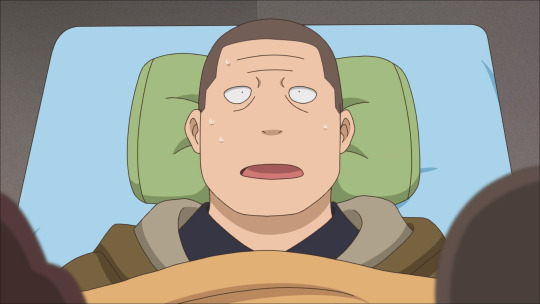
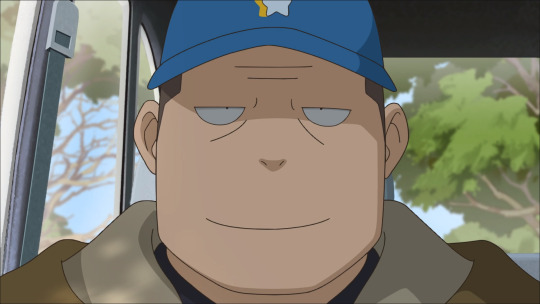
#i say 'fuck u' in a positive way n this case#odd taxi spoilers#oddtaxi spoilers#please watch this anime pls pls#kakihana arc might gross you out at first but he gets his comeuppance p fast#text post
18 notes
·
View notes
Text
Man ODDTAXI is something else. It’s like a meeting of Durarara and BoJack Horseman, which imo are 2 of the best animated shows ever made (BoJack might actually be the best show I’ve ever seen full-stop, but that’s besides the point).
The first three episodes are fantastic but episode 4 was like an absolute gut-punch and I cannot wait to see where this show is going. Please please please if you have the time go watch it, it seems like it’s kind of going under the radar for the most part but it is fucking fantastic and deserves way more attention than it is getting.
#ODDTAXI#I get that the premise doesn't seem super interesting on its face#but it is absolutely worth your time#I'm actually begging you#please watch this show#shut up Jean
7 notes
·
View notes
Text
Why ODDTAXI’s Episode 4 is a Masterpiece (Analysis)
youtube
By: Beata Garrett | @zhongxia246
When ODDTAXI began airing in April last year, I’ll admit that I wrote it off as a copy of Aggretsuko. If I wanted to watch anthropomorphic animals in a realistic setting, I would just watch that or Beastars, but, by some happenstance, I began watching it one day despite all the other anime on my list that seemed to have a more interesting plot.
On the surface, ODDTAXi is about Odokawa, a taxi driver who becomes involved in a series of shenanigans that invite the yakuza and romance into his life--both of which are unwanted and unnecessary, in his opinion. And it is that, but it’s also about how we use defense mechanisms to escape reality: the healthy necessity of confronting your past, whether fate is just a series of coincidences, and why humans keep living. No episode masters all of these themes better than Episode 4, titled “Tanaka’s Revolution.”
First of all, this is the only episode that focuses entirely on one character. While Episode 13 and Episode 11 spend about half of the episode explaining the backstory and motivations of one character, Episode 4 is unique in the time it uses to delve into the psyche of Tanaka Hajime. The narrator is Tanaka himself, and he calmly explains how he got to the point that he’s at, running desperately through the streets in dirty clothes and clearly sleep-deprived. He begins explaining that the story started four years ago, but we end up going back fifteen years instead to watch the events of a tragedy unfold.
(Editor’s Note: Please assume from this point forward that everything--quotes, images, and summaries--in this post, unless cited otherwise, comes directly from ODDTAXi, Episode 4. Thank you.)
One of the most important things about Tanaka is that his life revolves around gaming. He says, “Games are supposed to be an escape from reality” but immediately admits that the advantage of having friends, time, and money within a game is the same as reality. This immediately sets the groundwork for his character being a loner who escapes from reality through games but, perhaps subconsciously, understanding that a game is just a mimicry of reality anyway. Later on, we’ll see how he progressively uses gamer lingo as he becomes unable to separate reality from fiction and how he attributes all his troubles to a story about erasers. The opening shows this nicely through its animation, which has Tanaka running as if he’s in a game--he avoids getting hit with obstacles, and acquires loot in the form of erasers (very specific ones, too).
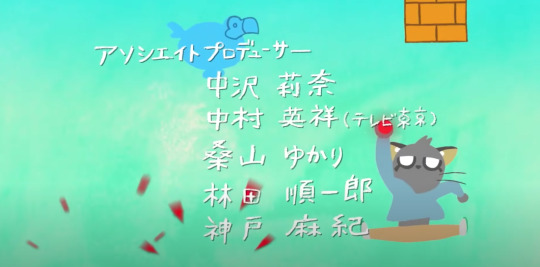
The flashback to Tanaka in middle school reveals the circumstances that have shaped him as, despite the homeroom teacher attempting to instill equality, the kids in his class found ways of showcasing their superiority to other kids. Trying to force students to be equal through some sort of standardization (uniforms, for example) may not work, and it certainly didn’t for Tanaka. Things like being smart, attractive, or artistic seemed out of reach for him, and it became more about what one was inherently born with in his eyes.
So, Tanaka had to find something else. Erasers became his way of trying to fit into what he initially claims was the class hierarchy, but he quickly reveals that he lied. The erasers were only important to him.
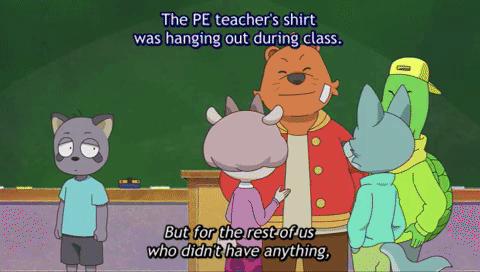
This confession puts him in the realm of being an unreliable narrator, but it’s fascinating to watch him quickly correct himself. Because he’s older as the narrator, he addresses his past self with a level of wisdom and rationality that he didn’t have as a kid but cannot completely disentangle his feelings from the situation. In simpler terms, he rationally knows that his thoughts are wrong and misguided but continues giving in to them because he can’t deal with the alternative: admitting that he’s scared and doesn’t know how to deal with the issues that arise.
Instead of trying to make friends by playing or talking to them, Tanaka resorts to competing with Sato, the only other kid who collects erasers. Luck comes into play again as Sato’s wealthy parents bring him rare erasers back as souvenirs, but Tanaka is confident in competing with him because he has one eraser. Ironically, this eraser is in the shape of a dodo bird:
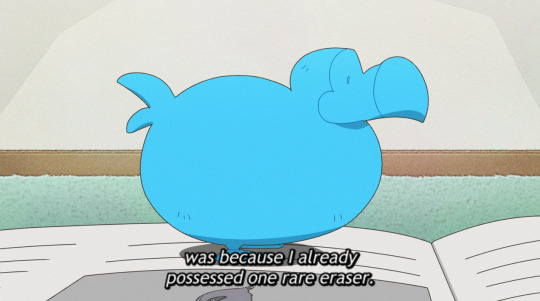
Dodo birds have a pretty bad reputation as ugly, flightless birds destined to become extinct, but their “clumsy” anatomy was actually suited for their environment (you know, until the second half of the 17th century when the last one died, probably from humans indirectly introducing more predators into their ecosystem). Regardless, the dodo eraser, which he was so proud of, eventually becomes useless to him because Sato’s wealth allows him to buy more erasers.
Like the dodo itself, the eraser becomes all but extinct in Tanaka’s mind. He realizes later that he projected himself onto this bird “that went extinct without ever learning to fly,” revealing how trapped he is and unable to understand that the dodo evolved to be flightless because it didn’t have to fly.
After the dodo, another important bird is introduced to Tanaka’s life; Maru, the male grey cockatiel that his parents buy him, but which he notes is cheaper than the computer games they buy for his brother. Tanaka’s dad explains that he’s trying to cultivate “aesthetic sensibility” in his son, and Maru also becomes Tanaka’s only friend. (By the way, I honestly spent some time looking up whether it was really male and analyzing the coloration until I realized it’s probably not important!)
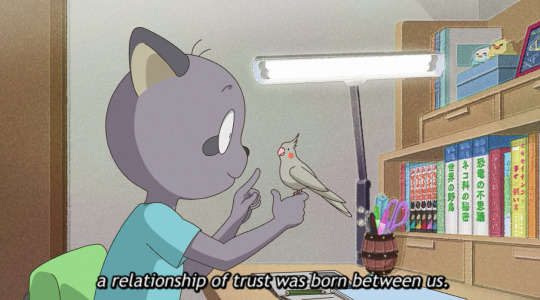
I find the idea of “aesthetic sensibility” particularly interesting because Tanaka’s obsession with collecting erasers should come from that, but it doesn’t. Tanaka’s focus is on quantity and rarity. Collecting on that basis instead of one based on aesthetic sensibility or personal meaning makes it more addictive and like a job rather than a hobby. It’s easy to disparage Tanaka, but remember that he is a kid, and kids have weird little contests to prove their superiority constantly and that there are plenty of people who do the same thing, just with something else.
On a side note, I find the symbolism of erasers fascinating. They’re supposed to erase writing and they themselves become erased (and dirtier) the more you use them, but people who might never use them collect them.
As objects, their purpose has become very different from what they started out as, which actually parallels Tanaka’s own relationship with the dodo eraser and Maru. It emphasizes Tanaka’s own inability to detach himself from his past and his desire to “erase” or undo the incident that would ruin his current self (although there are many incidents that led him to his current path).
Tanaka tries to compensate for the wealth disparity between him and Sato by using "high-class techniques," like smugly returning to ordinary erasers or with bread like an art student (which you have to roll into a ball and then air cure to use in such a way), but is unable to keep up.
It seems hopeless until he comes across a one-of-a-kind Donraku eraser.
Tanaka takes his dad's credit card and begins a bidding war (that's probably machine-automated) and wins it only to realize everyone has moved on from erasers.
(If you've ever taken money from your parents as a kid, you're probably cringing while reading this like I was when I watched the episode. You can imagine the euphoria a kid would experience from sneakily using their parent's credit card online only to have that flipped when your parents find out.)
Maru reappears in the next shot, staring at Tanaka from within his cage as if judging him. We'll see Maru a few more times as Tanaka continues his story, leading Maru to become emblematic of Tanaka's innocence.
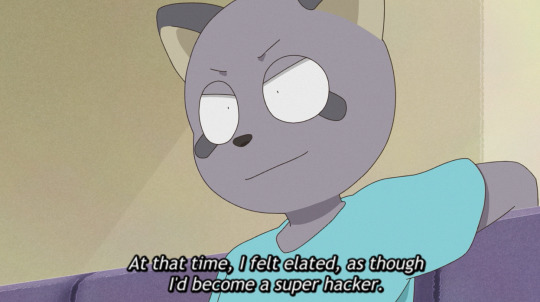
Tanaka ends up spending the yen equivalent of about $1000 on the eraser, which never arrives. When being beaten by his dad for using the credit card, he wonders whom to blame (“My teacher. My classmates. Sato [...] Me. My Country. History”) and admits that he could only blame himself. This is where his revolution against the hierarchy seems to end.
The title episode and idea of revolution has multiple layers. In the context of this scene, it refers to how Tanaka fancied himself a revolutionary who would usurp Sato and bring equality to the class, despite it obviously being about superiority. Revolution is also a cyclical movement, and Tanaka’s own mind moves in a very circular way, in which he tends to blame people, then himself, and is unable to completely make up his mind.
Of course, he grew up after the auction incident. He got a job. Still didn’t make many friends, but he was doing okay until the wheel spun further and he ended up at the bottom of the hierarchy--the same position he was in as a kid. In the last half of “Tanaka’s Revolution,” he becomes addicted to a mobile game, Zooden, and obsessed with revenge on the taxi driver who caused him to lose the super rare dodo he was hunting for.
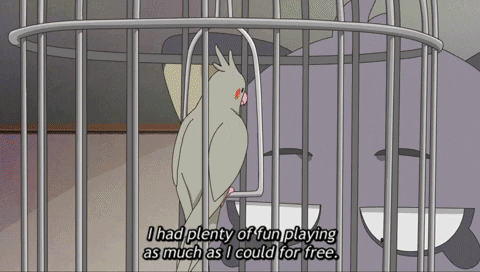
The problem was not Zooden itself. Multiple coincidences such as the number-one ranked player being the same username as the person who sold him the Donraku eraser and the dodo existing in the game created a sense of destiny. He spent more and more money on Zooden as he saw it as a chance to get revenge on the person that so wronged him as a kid, and to reignite the revolution.
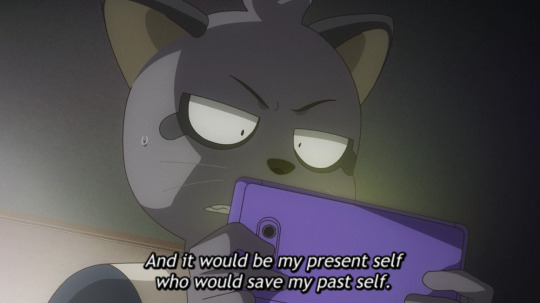
Tanaka ends up getting the dodo after four years, but loses it on the same night when a certain taxi driver almost runs him over. By then, it’s clear that his goal has taken a toll on him. He’s visibly more tired, dressed more casually at work, and begins hallucinating. He says to himself, “It’s a sickness,” but doesn’t want to deal with the repercussions of admitting that he needs help. It’s a vicious cycle that may seem familiar to people who struggle with their mental health and the denial of it can push people to the precipice (as we see with Tanaka in Episode 13).
My heart broke when Tanaka rolled the dodo but then lost it immediately. The animation does an excellent job showing the utter disbelief and despair on his face, but that’s not all that happens because “fate is cruel, and God had taken something else from [him].” Worse still, following this his long-time companion, Maru, dies (whether it’s from simple old age or Tanaka forgetting to feed him is not clear but it’s devastating).
Tanaka’s target switches from being the first ranked user that scammed him to the taxi driver that seems to have taken everything from him in another example of how we displace blame onto others as a way to deal with our grief.
Fate truly is cruel because Tanaka opens a box we just saw at the end of Episode 3 when burying Maru in the park and finds a gun. This leads to some of the best lines in the episode as he says, “There must be someone who made this world, too. Perhaps this world has been programmed. Hey, God. It’s you.”
A perfect opportunity comes for Tanaka to return the pain that he’s felt onto the taxi driver that has become a stand-in for everyone that has done him harm. These lines reveal so much about Tanaka’s sense of loss and control and how he recovers it by pretending the world is a video game, and now that he has God/a gun, he is destined to win. He has an almost religious devotion to righting the wrongs of his past, and sets out to find Odokawa.
Tanaka knows all of his desires and pleasures are temporary, but that’s exactly why he needs something to latch onto. Yet, there’s also a strange pleasure from making yourself the victim of the same story again and again, and looking for someone to attack. Humans are wired to remember painful experiences more so we can avoid the thing that caused us pain, and it’s no different here as Tanaka wanders the streets in search of his white whale, seen with him jolting every time he sees a taxi.
In another sense, for Tanaka, Odokawa nearly running him over has given him the next level in this game he’s playing and a new boss to defeat. The final shot of the episode is chilling in its depiction of just how far Tanaka will go to to recover what he feels has been lost:
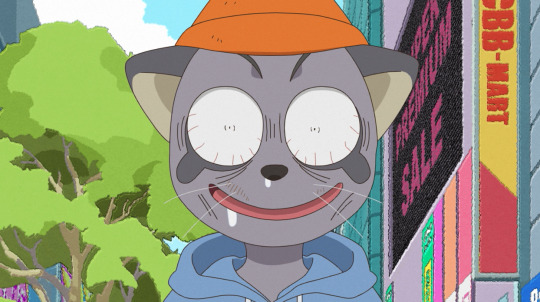
I can’t help but find the episode masterful in its uses of these images as motifs to follow the story of a man that is the epitome of the sunk-cost fallacy and displacement. It’s a great, though chilling, depiction of unhealthy thinking and the fatalism that doesn’t fully villainize the character since we’ve seen everything leading up to these moments.
If you’ve seen ODDTAXI, what are your thoughts on this episode? Is there anything that I missed or that you read differently? Please let me know!
#ODDTAXI#Analysis#Tanaka’s Revolution#sunk-cost fallacy#displacement#Tanaka Hajime#Mental health#tanaka#odd taxi
18 notes
·
View notes